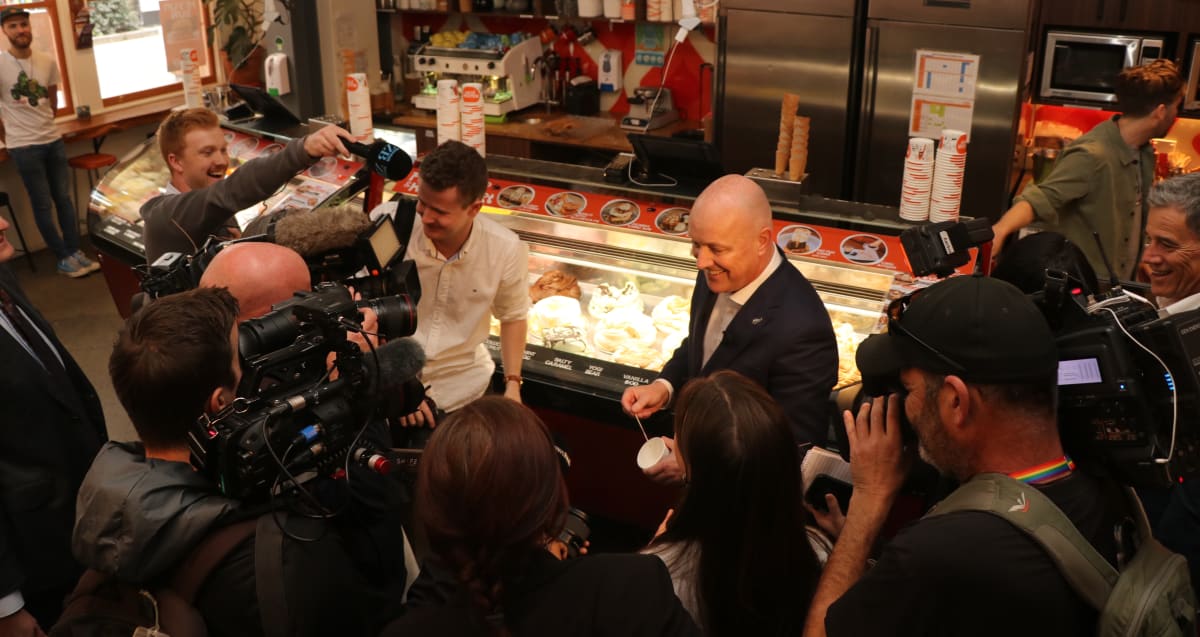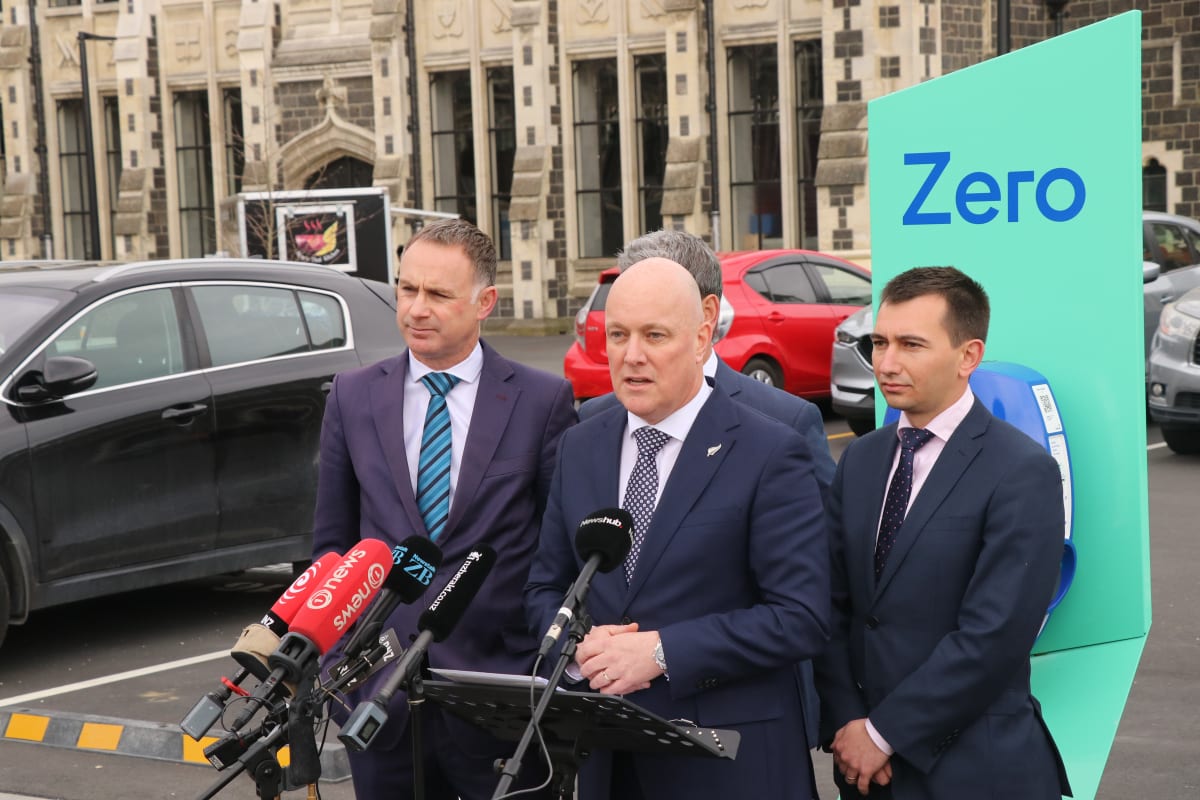
A hometown boy returns to Christchurch for a true-blue love-in
Comment: Taking Christopher Luxon’s visit to Christchurch yesterday as a yardstick, a fair chunk of this election campaign will be a confection, made for television.
It always is.
The political pilgrimage to a central Christchurch gelato establishment follows the three-yearly electoral cycle now, a marketing dream wrapped in a message of energising young people to vote.
READ MORE: * National to elevate climate minister * A postcard from Christopher
There’s something of a cold war.
Pollies like Luxon get free rein to ham it up for the cameras, providing media outlets with cutaway shots, as long as he’s not button-holed for serious comment until the stand-up portion of the day.
Yesterday, Luxon donned a hair net and mixed gelato, after trying to make cones faster than an employee – the store’s “most gunniest scooper”, Luxon suspected.

“You’ve got this, Chris!” yelled Christchurch Central candidate Dale Stephens.
“That was so much fun!” the National leader gushed afterwards.
But there can also be useful insights.
Conversation in the gelato shop after Luxon left turned comparative.
Luxon seemed enthusiastic and “on”, I offered. Apparently two other National leaders on previous campaign visits to Christchurch showed a different side – Judith Collins in 2020 seemed exhausted, and Don Brash was thought not to have the common touch.
Living in a fish bowl – the cameras always rolling – is odd, and can narrow the public’s view of a politician. Often when you meet them in person, having already formed an opinion, they can surprise you with their warmth and personable nature.
In the reality-warp of campaigns, then, the cameras can be part of the confection.

Touchy-feely campaigning can lead to fun narratives.
Luxon in the gelato shop switching from “any flavour as long as it’s chocolate” to “berry” could be characterised as a policy flip-flop. The “gunniest scooper” employee, Anton Jackson, not revealing his voting choice to me might be Luxon not being convincing.
Which is all nonsense, of course, but good fun.
It was a true-blue love-in at yesterday’s press conference, with MPs Nicola Grigg, Matt Doocey, Simon Watts, and Simeon Brown, as well as Christchurch candidates Stephens, Vanessa Weenink (Banks Peninsula), and Hamish Campbell (Ilam).
More telling, perhaps, was who wasn’t there. When Judith Collins visited in 2020 she was trailed by Gerry Brownlee. He’s not exactly dead wood, however, despite losing the Ilam seat in 2020, as he occupies National’s highest list-only place, at No. 14 on the party list.

In the Arts Centre car park, Luxon bantered with colleagues before heading to Hagley Oval, the international cricket venue in Hagley Park, to whack a tennis ball around.
The National Party pushed the oval redevelopment through, Luxon said.
Indeed, John Key’s government earmarked Hagley Oval as an anchor project in the city’s post-quake recovery plan.
“People complained at the time,” said the Botany MP, who comes from the city, “but look at it now”.
Damned naysayers got it wrong, it seemed. Progress always wins.
Newsroom collared Stephens, the Christchurch Central candidate.
Last time we saw him, he was working the phones in the presence of former National leader Collins in 2020.
He actually stood unsuccessfully for National in the Ikaroa-Rawhiti Māori seat, won by Labour’s Parekura Horomia, in 1999. Jenny Shipley asked him to stand at the last minute because the previous candidate had a family bereavement.
Stephens, a Māori business director at New Zealand Trade and Enterprise, has iwi affiliation with Northland’s Te Rarawa, which has marae located on the southern tip of Te Oneroa a Tōhē/Ninety Mile Beach.
He lost Christchurch Central to Labour’s Duncan Webb in 2020 by more than 14,000 votes.
A Labour stronghold? Yes, it was from 1946 until 2011, when National’s Nicky Wagner, a list MP since 2005, won the seat by 47 votes, after special votes were counted.
Wagner won it again in 2014, before Webb snatched it back for Labour in 2017.
(National garnered about 45 percent of the party vote in 2014 and 2017, but less than 20 percent in 2020’s red wave.)

At No. 29 on National’s list, Stephens is a real chance to make Parliament, based on current polling. If his party’s in Government, he’s interested in roles to do with trade, Te Ao Māori, justice and law reform.
“With the greatest of respect to [former minister of everything] Steven Joyce, I could be the poor cousin who could turn his hand to most things.”
But he’s definitely trying to win Christchurch Central.
Stephens has been door-knocking since the last week of January, and reckons he’s spoken to 18,500 people. He wants to speak to 20,000 people by election day.
But it’s not a numbers game, Stephens maintains. The more people he sees the greater his understanding of the needs of a diverse electorate that takes in some of the city’s wealthy, and some of the most deprived.
Of general electorates, Christchurch Central has the second-highest proportion of one-person households in the country, at 31 percent, after Auckland Central.
Is Christchurch Central up for grabs? “Yeah, I think it is,” Stephens says. He’s hearing a “mood for change”.
“Most electorates across the country have been affected [at the 2020 election] by what we call the Covid effect. And so there’s a certain mass that can be attributed to that general groundswell around Covid.”
Labour is vulnerable in a number of metropolitan areas, Stephens believes. “That Covid swing will be neutralised, and then, frankly, it’s game on.”
What might help, of course, are Christchurch-specific policies. Does National have anything up its sleeve?
“We do have a couple of initiatives that will be announced,” Stephens says, “and obviously I’m not the person who announces them.”







